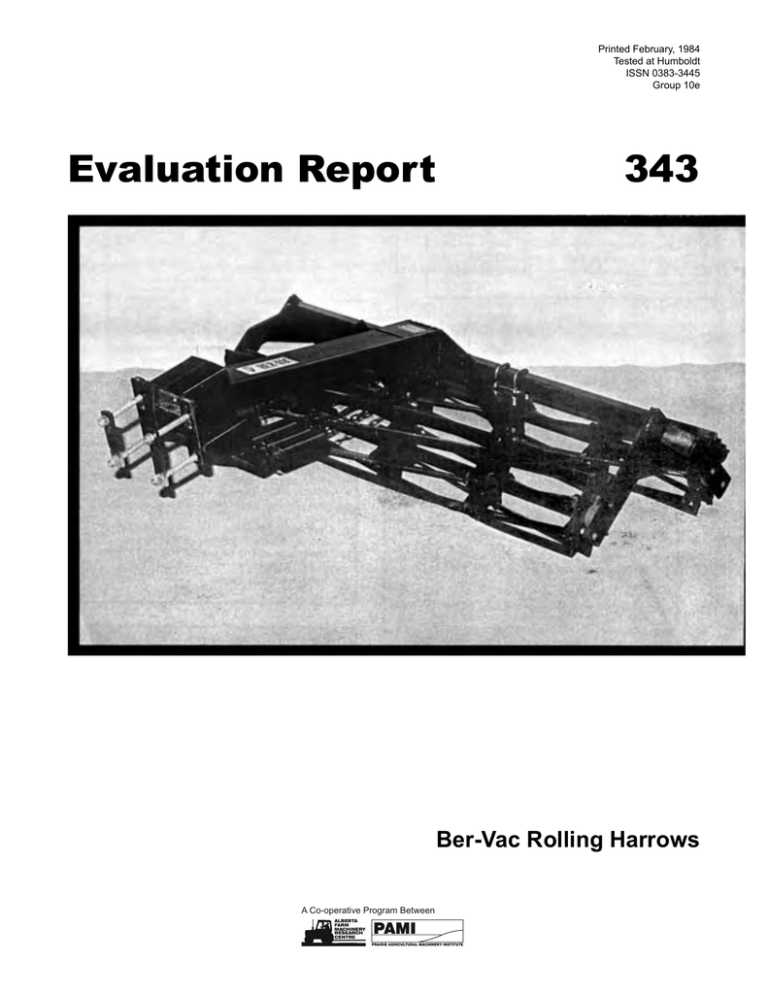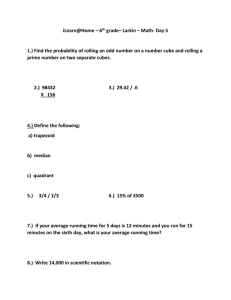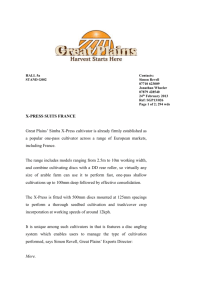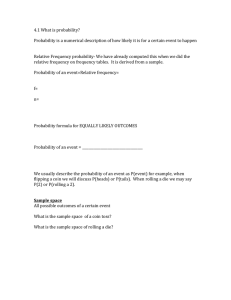343 Ber-Vac Rolling Harrows
advertisement

Printed February, 1984 Tested at Humboldt ISSN 0383-3445 Group 10e Evaluation Report 343 Ber-Vac Rolling Harrows A Co-operative Program Between ALBERTA FARM MACHINERY RESEARCH CENTRE PAMI PRAIRIE AGRICULTURAL MACHINERY INSTITUTE BER-VAC ROLLING HARROWS MANUFACTURER Ber-Vac Inc. 2835 Chemin De L’Aeroport Thetford Mines, Quebec G6G 5R7 DISTRIBUTOR: A.I.S. Industries Ltd. 1485 Erin St. Winnipeg, Manitoba R3E 2S9 RETAIL PRICE: $699.00 (February, 1984, f.o.b. Humboldt, Saskatchewan, 60 in (1520 mm) wide unit with 60 in (1520 mm) long harrow arm). 3. Modifying the mounting brackets to allow mounting on more frame sizes and to prevent bending. 4. Providing an operator manual that contains information on setup, operation and adjustment, safety, and servicing. Senior Engineer: G.E. Frehlich Project Technologist: A.R. Boyden THE MANUFACTURER STATES THAT With regard to recommendation number: 1. & 2. Ber-Vac will be testing a new heavy duty roller this spring, designed specifically for work in rocky conditions. Heavier flat bar and more star supports will be used to prevent the roller bars from bending. Also, a mechanism will be used to prevent rocks from jamming between the roller bars. Ber-Vac now offers two “L brackets” on each bearing as standard equipment. These are very effective in preventing rocks from jamming between the roller and bearing, and preventing material from wrapping around the bearing. 3. Different size U-bolts are now available from the factory to accommodate different size frames. As this is a universal mounting, extra holes may have to be drilled in the attaching head to fit certain frame sizes. 4. An operator manual will be prepared to provide information on setup, operation and adjustment, safety, and servicing. GENERAL DESCRIPTION FIGURE 1. Ber-Vac Rolling Harrows: (1) Rollers, (2) Hitch Frame, (3) Pressure Springs. SUMMARY AND CONCLUSIONS Quality of Work: The Ber-Vac Rolling Harrows left an even field surface in light trash conditions. In heavy trash and moist soil conditions, the harrows failed to level the surface ridges left by the cultivator shanks. The harrows were not effective in distributing trash. Plugging never occurred. Maximum packing force of the rolling harrows was 90 lb/ft (1310 N/m), similar to light coil packers. Packing was less in furrows left by the rear row of cultivator shanks. Weed kill was good in dry soil and light trash conditions. Ease of Installation: Two people could easily install the Ber-Vac Rolling Harrows. No installation instructions were provided. Shims were required for mounting the brackets on odd sized frames. Harrow sizes and adjustments were adequate to permit mounting the harrows without interfering with cultivator components. Ease of Operation and Adjustment: The Ber-Vac Rolling Harrows transported well when mounted on a cultivator. Hitch weight may become negative on some implements with the added weight of the rolling harrows. Harrow force adjustment was easy when the special tool supplied was used. Rocks caught within the rollers at high spring force settings. Power Requirements: The Ber-Vac Rolling Harrows required 0.5 hp/ft (1.2 kW/m) of tractor power to maintain operation at 6 mph (9.7 km/h). This was less than conventional tine harrows. Safety: Extreme caution was required when adjusting spring tension. Operator Manual: No operator manual was supplied with the rolling harrows. Mechanical History: Two mechanical problems occurred during the test. The mounting plates and roller bars bent in rocky conditions. RECOMMENDATIONS It is recommended that the manufacturer consider: 1. Modifications to the rollers to prevent rock jamming. 2. Modifying the rollers to prevent the roller bars from bending. Page 2 The Ber-Vac Rolling Harrows are mounted behind cultivators or other tillage machines and used for seedbed preparation, chemical incorporation, and soil finishing after seeding. The harrows are available in widths of 20, 40, and 60 in (508, 1020, and 1520 mm) with harrow arm lengths of 20, 40, or 60 in (508, 1020 and 1520 mm). The Ber-Vac Rolling Harrows consist of two rollers formed from 8 steel bars welded in a spiral across the roller length. The two rollers are offset and pivot on the harrow arm to follow ground contours. The harrow arm is mounted on 3 or 4 inch (75 or 100 mm) implement frames. Tension springs with adjustable chains provide additional harrow packing force. FIGURE 1 shows the location of major components while detailed specifications are given in APPENDIX I. SCOPE OF TEST A single 60 in (1520 mm) wide Ber-Vac Rolling Harrow unit was mounted on an intermediate cultivator and operated for 102 hours while cultivating stubble and summerfallow, and preparing a seedbed. Thirteen hours of the test were spent in very stony conditions. The harrow was evaluated for quality of work, ease of installation, operation and adjustment, power requirements, and safety. RESULTS AND DISCUSSION QUALITY OF WORK Soil Finish: High harrow force settings were required to level the surface ridges left by the intermediate cultivator in light trash and dry soil conditions (FIGURE 2). In heavier trash and moist soil conditions (FIGURE 3), the harrow rollers failed to penetrate the soil and level the surface ridges left by the cultivator shanks. The harrows were very effective in breaking lumps of soil. Straw Spreading: The Ber-Vac Rolling Harrows were not effective in distributing trash. The harrows did not plug with trash, even in heavy trash conditions. Packing: The Ber-Vac Rolling Harrows had a maximum packing force of 90 lb/ft (1310 N/m) which is similar to light coil packers. Packing was always less in furrows left by the rear row of cultivator shanks. Weed Kill: The Ber-Vac Rolling Harrows aided in exposing loosened weeds left by the cultivator in dry soil and light trash conditions. However, many weeds were transplanted in moist soil conditions. In heavier trash conditions, poor roller penetration limited weed kill performance. FIGURE 2. Field surface in Dry Soil: (1) Ber-Vac Rolling Harrows, (2) Tine Harrows. FIGURE 4. Rocks Caught in Rollers. POWER REQUIREMENTS Draft: Average draft per foot of width for the Ber-Vac Rolling Harrows was 16.2 lb/ft (236 N/m), which is less than tine harrows. This occurred in preworked summerfallow with light trash cover. Tractor Size: Field power measurements indicated that an additional tractor power take-off rating of 0.5 hp/ft (1.2 kW/m) was required to pull the Ber-Vac Rolling Harrows in secondary tillage at 6 mph (9.7 km/h). This power requirement must be considered when adding Ber-Vac Harrows to an implement. For example, installing 35 ft (10.7 m) of harrow behind a cultivator will require an additional 17.5 hp (13 kW), to maintain operation at 6 mph (9.7 km/h). This value represents power take-off rating of tractors operating at 80% of maximum power on a level field, and have been adjusted to include tractive efficiency. FIGURE 3. Field surface in Moist Soil: (1) Ber-Vac Rolling Harrows, (2) Tine Harrows. EASE OF INSTALLATION It took two people approximately one-half hour to install a single Ber-Vac Rolling Harrow unit on the rear of a cultivator. The mounting brackets were made to fit a 3 or 4 in (75 or 100 mm) frame. The frame of the test cultivator was 3-1/2 in (90 mm) square and shims were required for mounting the harrows. It is recommended that the manufacturer modify the mounting brackets to allow mounting on more frame sizes. The parts description and illustration were useful for identifying and assembling harrow parts. No information was provided for installing the harrows. Care must be taken when sizing and positioning the rolling harrows to prevent any interference with the cultivator. Harrow sizes and adjustment were adequate for locating the harrows without interfering with shank locations or folding of the cultivator for transport. EASE OF OPERATION AND ADJUSTMENT Transporting: The Ber-Vac Rolling Harrows transported well at normal transport speeds when mounted on a cultivator. Harrows mounted on the cultivator wing rested firmly when the wing was in the vertical position. Hitching: The added weight of the Ber-Vac Rolling Harrows may result in a negative hitch weight on some implements, making hitching to a tractor drawbar inconvenient. Harrow Force: Harrow force could be easily adjusted when using the tool supplied. The tool was used to stretch the springs so the chain links could be moved through the keyhole slots. Extreme caution was required when making this adjustment. At high spring force settings, small rocks passed through the roller bars and were caught within the rollers (FIGURE 4). Also, rocks occasionally jammed between the rollers and frame preventing the rollers from rotating. Servicing: The three grease fittings required greasing at 50 hour intervals. Straw or weeds wrapped around the bearings and had to be removed periodically. OPERATOR SAFETY Extreme caution was required when adjusting the spring tension on the Ber-Vac Rolling Harrows. The adjustment tool supplied by the manufacturer should be used at all times when adjusting the spring tension. OPERATOR MANUAL No operator manual was supplied with the Ber-Vac Rolling Harrows. It is recommended that complete operating instructions be supplies. DURABILITY RESULTS The intent of the test was evaluation of functional performance. An extended durability test was not conducted. The roller bars and the harrow mounting plates bent in 102 hours of operation. DISCUSSION OF MECHANICAL PROBLEMS Rollers: The roller bars bent (FIGURE 5) while working in stony conditions at high harrow force settings. It is recommended that the manufacturer modify the rollers to prevent bending of the Page 3 roller bars. APPENDIX I SPECIFICATIONS MAKE: MODEL: MANUFACTURER: FIGURE 5. Bent Roller Bars. Mounting Plates: The harrow mounting plates (FIGURE 6) bent while motlnted on a 3-1/2 in (90 mm) cultivator frame. It is recommended that the mounting brackets be modified to prevent bending. Ber-Vac Rolling Harrows 5 ft (1.5 m) size Ber-Vac Inc 2835 Chemin De L’Aeroport Thetford Mines, Quebec G6G 5R7 DIMENSIONS: -- width -- length -- height (as mounted) 63 in (1610 mm) 61 in (1550 mm) 34 in (875 mm) ROLLERS: -- number -- roller length -- diameter -- distance between roller axles -- axle diameter -- number of roller bars 2 56.7 in (1440 mm) 10 in (254 mm) 19.5 in (495 mm) 1-3/8 in (35 mm) 8 HITCH: -- length -- cross section -- frame mounting size 39 in (990 mm) 5 x 2-1/2 x 3/16 in (127 x 64 x 4.8 mm) rectangular tubing 3 to 4 in (75 to 100 mm) TOTAL WEIGHT: 276 lb (125 kg) SERVICING: 3 grease fittings, 50 hour service SIZES AVAILABLE: -- widths -- hitch lengths 20, 40, 60 in (508, 1020, 1520 mm) 20, 40, 60 in (508, 1020, 1520 mm) APPENDIX II MACHINE RATINGS The following rating scale is used in Machinery Institute Evaluation Reports: excellent fair very good poor good unsatisfactory CONVERSION TABLE APPENDIX III FIGURE 6. Bent Mounting Plates. Page 4 IMPERIAL UNITS Acre (ac) Foot (ft) Inches (in) Horsepower (hp) Miles/Hour (mph) Pounds Force (lb) Pounds Force/Foot (lb/ft) Pounds Mass (lb) MULTIPLY BY 0.405 0.305 25.4 0.746 1.610 4.450 14.6 0.454 S.I. UNITS Hectare (ha) Metre (m) Millimetres (mm) Kilowatt (kW) Kilometre/Hour (km/h) Newton (N) Newton/Metre (N/m) Kilogram (kg) SUMMARY CHART BER-VAC ROLLING HARROWS RETAIL PRICE: $699.00 (February, 1984 f.o.b. Humboldt, Saskatchewan, 60 in (1520 mm) wide unit with 60 in (1 520 mm) long harrow arm). EVALUATION COMMENTS QUALITY OF WORK -Soil Finish Good -Straw Spreading Poor -Packing -Weed Kill Good Good - reduced furrow filling in trashy conditions and moist soils -effective in breaking lumps of soil - not effective in spreading trash -plugging never occurred - packing was less in furrows - less effective in moist soil and trashy conditions Good - shims required for mounting on odd sized frames EASE OF INSTALLATION EASE OF OPERATION AND ADJUSTMENT - Transporting Very Good - Harrow Force Good - Servicing Very Good - when mounted on a cultivator frame - adjustment is easy when special tool is used - 3 grease fittings POWER REQUIREMENTS PER FOOT PER METRE - Draft at 6 mph (9.7 km/h) 16.2 lb 236.0 N - Power requirement at 6 mph (9.7 km/h) 0.5 hp 1.2 kW - in preworked summerfallow CAUTION This summary chart is not intended to represent the final conclusions of the evaluation reports. The relevance of the ratings is secondary to the information provided in the full text of the report. It is not recommended that a purchase decision be based only on the summary chart. Prairie Agricultural Machinery Institute Head Office: P.O. Box 1900, Humboldt, Saskatchewan, Canada S0K 2A0 Telephone: (306) 682-2555 3000 College Drive South Lethbridge, Alberta, Canada T1K 1L6 Telephone: (403) 329-1212 FAX: (403) 329-5562 http://www.agric.gov.ab.ca/navigation/engineering/ afmrc/index.html Test Stations: P.O. Box 1060 Portage la Prairie, Manitoba, Canada R1N 3C5 Telephone: (204) 239-5445 Fax: (204) 239-7124 P.O. Box 1150 Humboldt, Saskatchewan, Canada S0K 2A0 Telephone: (306) 682-5033 Fax: (306) 682-5080 This report is published under the authority of the minister of Agriculture for the Provinces of Alberta, Saskatchewan and Manitoba and may not be reproduced in whole or in part without the prior approval of the Alberta Farm Machinery Research Centre or The Prairie Agricultural Machinery Institute.




